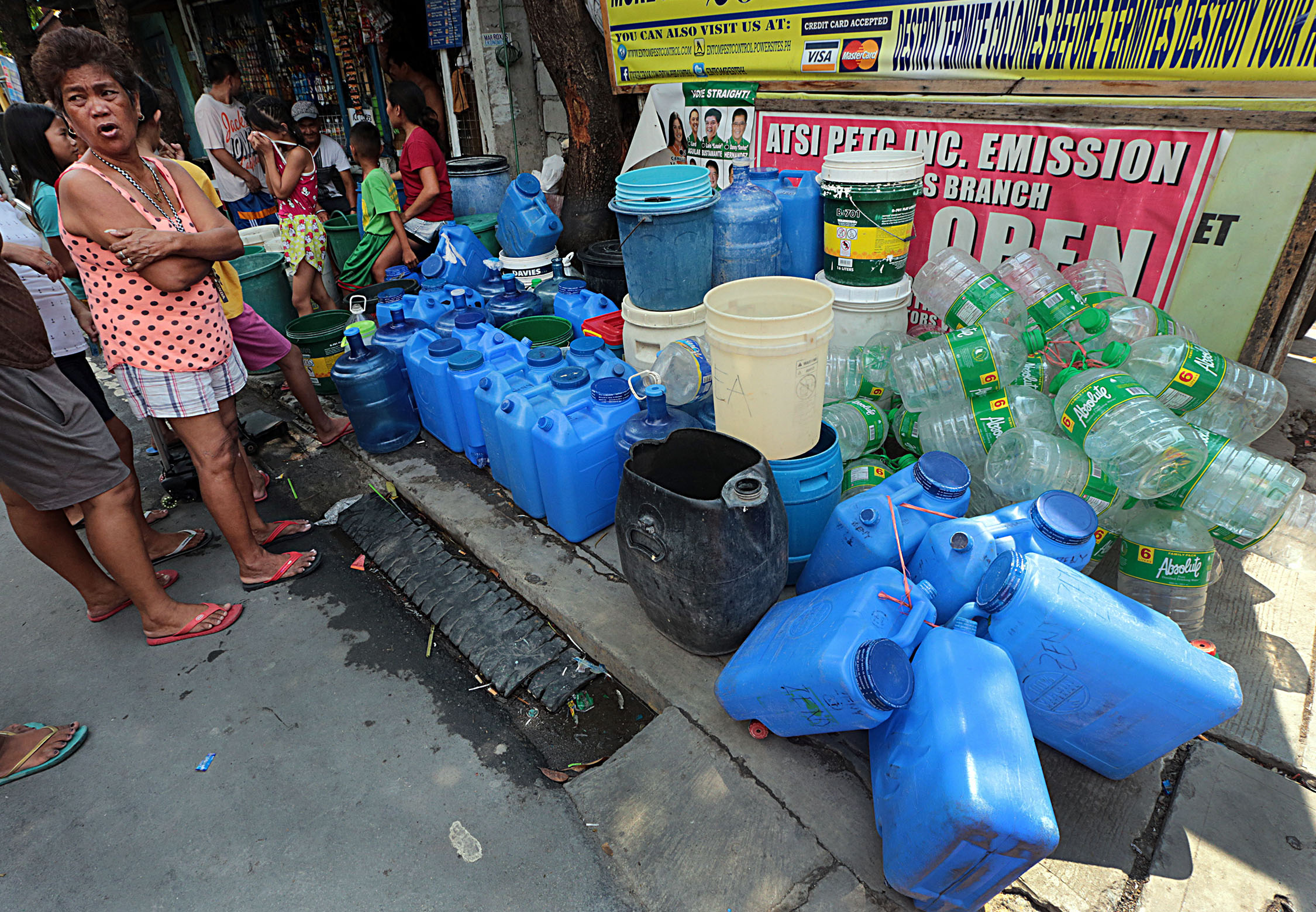
PRECIOUS DROP Manilans are again struggling to get water as the distributors fail to keep the service interruption schedules
that they have introduced to conserve supply. GRIG C. MONTE GRANDE
The National Water Resources Board (NWRB) on Thursday urged Metro Manilans to save water, warning that it might impose rationing if the stock in Angat Dam dropped below the critical level.
Angat Dam, in Bulacan province, supplies 90 percent of Metro Manila’s water needs.
The Angat stock has been dipping since the peak of summer, causing a knock-on effect on the reserve at La Mesa Dam in Quezon City.
In March, the water elevation at La Mesa Dam breached the critical low level of 69 meters above sea level (masl), setting off a water crisis in the east zone that the private distributor Manila Water Co. Inc. failed to anticipate.
The government has been trying since early June to replenish the Angat stock through cloud-seeding, but the summer heat, which lingers despite the onset of the rainy season, has prevailed.
Almost critical
On Thursday morning, the Philippine Atmospheric, Geophysical and Astronomical Services Administration (Pagasa) reported that the water elevation in the dam had dipped further to 160.50 masl, nearly breaching the critical level of 160 masl.
The dam’s minimum operating level is 180 masl. The reserve was 161.20 masl on Monday and was going down at about 0.4 meter daily, Pagasa said.
To conserve the stock, the NWRB reduced the raw water allocation for Metro Manila, forcing the two private distributors to announce earlier this week rotating service interruptions.
But taps ran dry even before the schedules of service interruption could start, causing a public uproar that compelled the Metropolitan Waterworks and Sewerage System (MWSS) to warn the distributors on Thursday that it would fine them if they failed to follow their own timetables.
Maynilad Water Services Inc. on Thursday began implementing throughout its west zone concession rotational, daily service interruptions lasting seven to 14 hours.
Manila Water also began implementing a revised schedule for the east zone “for about eight to 12 hours during nighttime.”
Manila Water’s customers have been enduring low pressure to no water since March, when the La Mesa Dam stock dipped to lower than the critical level.
It seems to be an unending problem that has become worse in recent days because of erratic service.
“The MWSS regulatory office has determined that the two concessionaires have failed to observe the water service interruption schedules that they announced,” the agency’s chief regulator Patrick Ty said in a statement on Thursday.
“While the two [companies] may not be blamed for the current water supply situation . . . the schedules are well within their control, and for which they may be held accountable,” Ty added.
He said regulators would consider any period of actual service interruption occurring outside the schedule as “not having been the subject of proper notice to the customers.”
“Should such nonadherence continue, this may constitute a violation of the concession agreement, and the MWSS [regulatory office will] recommend the imposition of appropriate penalties,” Ty said.
Bayan Muna warning
The MWSS meted out a P534-million fine to Manila Water for its failure to provide 24-hour service to its customers for 15 days in March.
The fine comes in the form of a rebate to customers, which is reflected on their bills for June.
Militant party list group Bayan Muna on Thursday warned Manila Water that it would file another complaint against the distributor for more rebates if it could not end the water problem in the east zone.
Mary Joy David, project development officer at the Bureau of Soil and Water Management (BSWM), on Thursday said the agency would extend cloud-seeding hours to help generate rainfall over Angat Dam.
The BSWM has been sending up two to three cloud-seeding flights whenever experts spot clouds over the dam, David said.
Each flight runs an hour and carries 25 sacks of iodized salt, each weighing 25 kilograms, to be thrown into the clouds to induce a chemical reaction that causes rain.
David said the bureau had already conducted 50 hours of cloud-seeding operations since June 7.
Water elevation at Angat has not dropped to precarious levels since 2010, when a strong El Niño caused very dry conditions in the Philippines.
The consumer group Laban Konsyumer on Thursday called on the NWRB to lift the ban on deep well drilling in Metro Manila to ease the water problem in the metropolis.
In a statement, Victorio Dimagiba, the group’s president, said the ban could be lifted until the stock in the dams had been replenished.
Since the water shortage in the east zone in March, the NWRB had allowed Manila Water to reactivate old wells for it to have additional sources of water. —WITH A REPORT FROM MELVIN GASCON